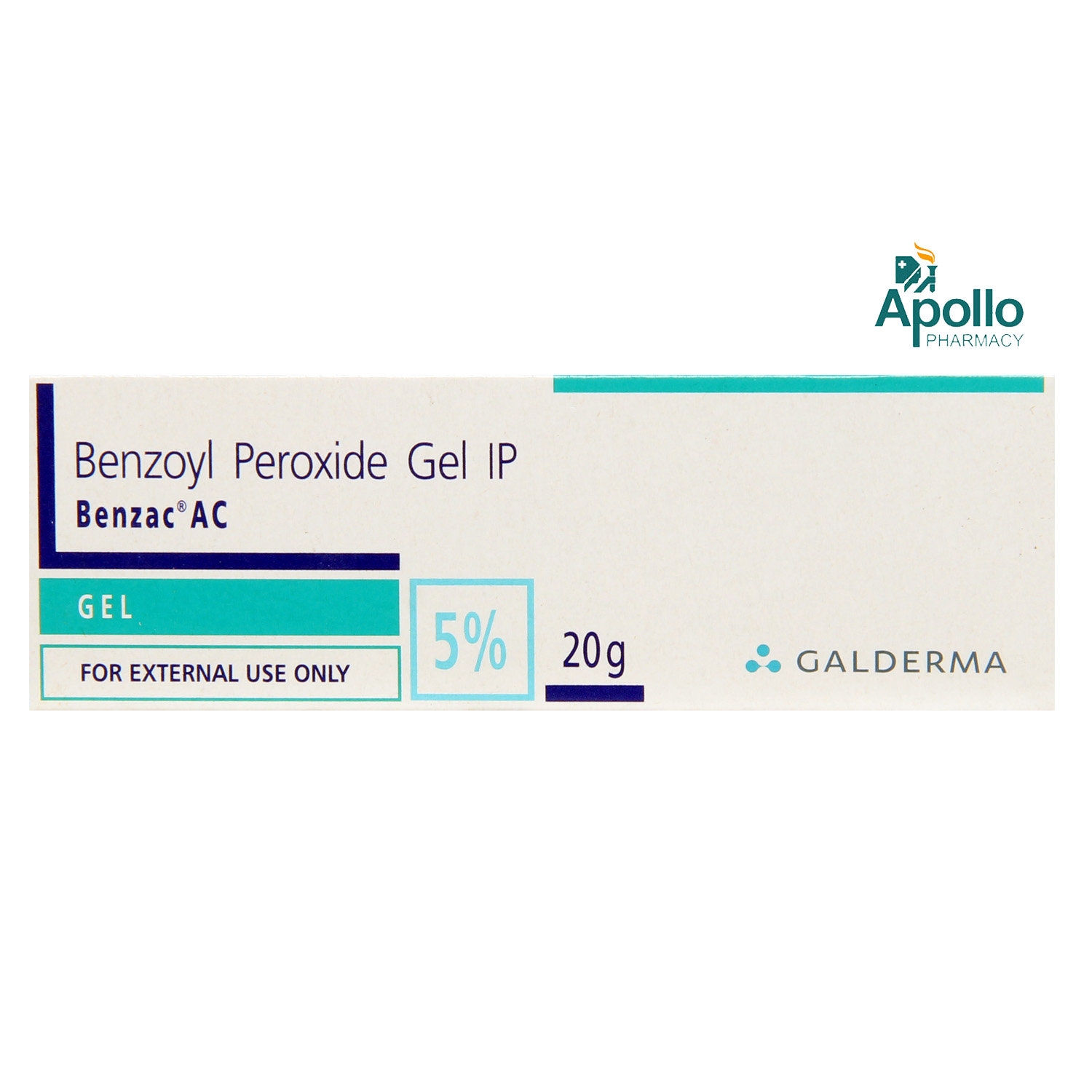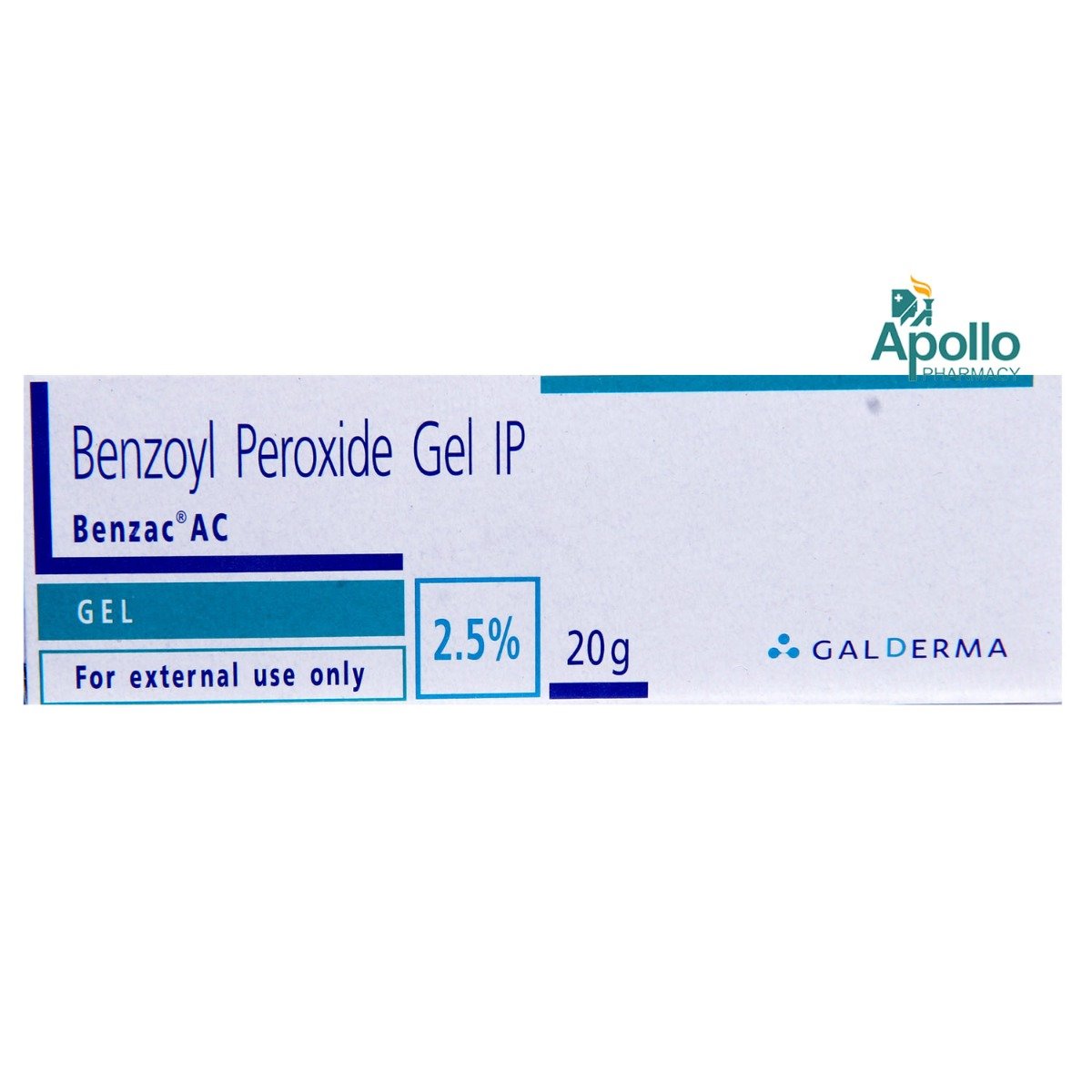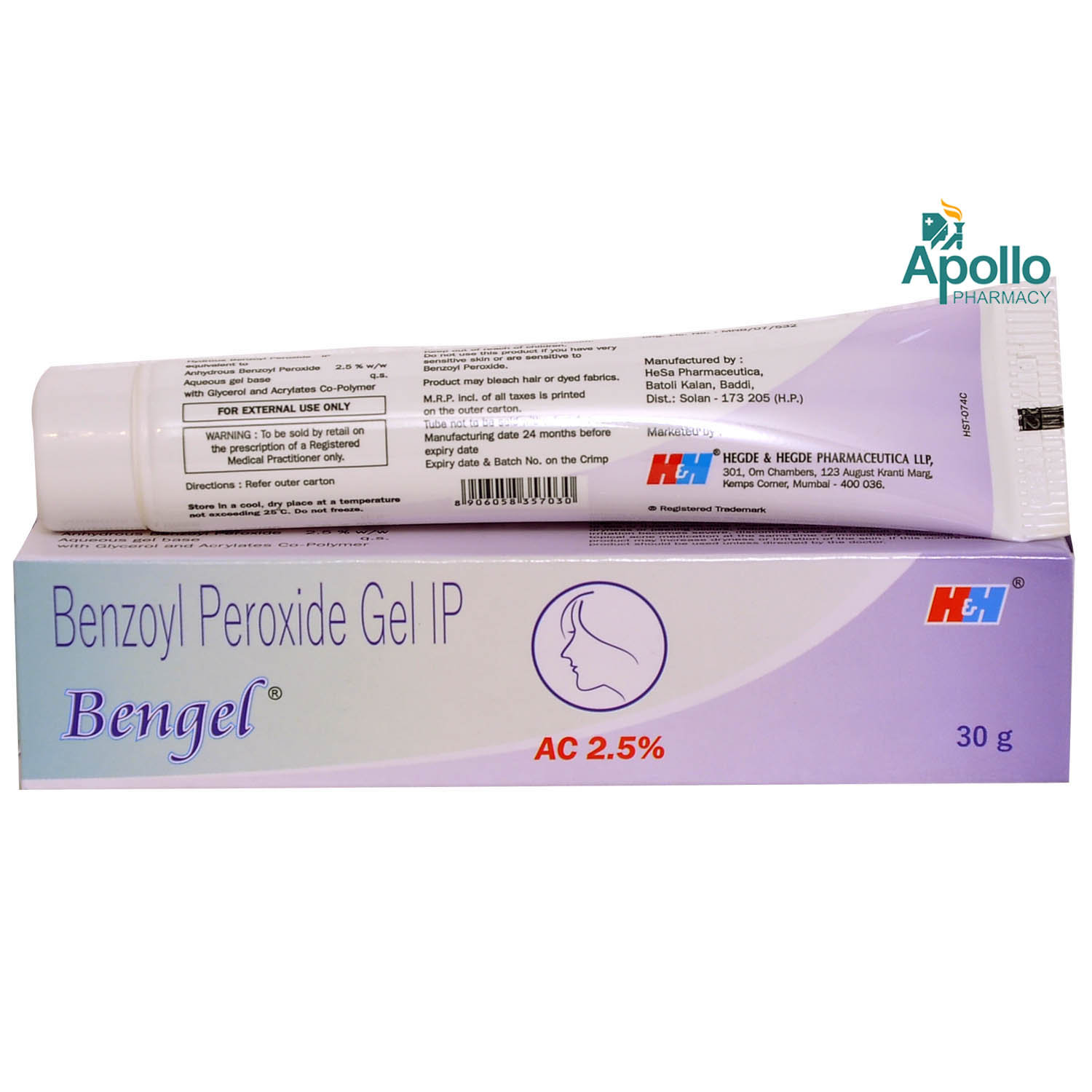Benzoyl Peroxide
About Benzoyl Peroxide
Benzoyl Peroxide belongs to the class of medication called ‘antibacterial agents' primarily used to treat bacterial skin infections like acne (pimples). Acne is a skin condition that occurs when the hair follicles become plugged with oil and dead skin cells.
Benzoyl Peroxide contains ‘Benzoyl Peroxide’ that kills bacteria, reduces inflammation and unplugs blocked pores. Benzoyl Peroxide decomposes to release oxygen when applied to the skin. This oxygen acts as a bactericidal agent and kills Propionibacterium acnes, the bacteria that causes acne. Benzoyl Peroxide increases the turnover rate of epithelial cells (cells that line the surface of the skin), eventually helps in peeling the skin and treating comedones (skin-coloured, small bumps due to acne). Benzoyl Peroxide also has a mild drying effect that allows excess oils and dirt to be washed away from the skin.
Benzoyl Peroxide is for external use only. Avoid contact with eyes, eyelids, lips, mouth and nose. If the medicine comes in contact with any of these areas, rinse with water immediately. Do not use Benzoyl Peroxide on sunburned, windburned, dry, or irritated skin. Common side effects of Benzoyl Peroxide include dry skin, erythema (skin redness), burning sensation, itching, skin irritation, swelling, blistering, crusting, and skin rash.
Let your doctor know if you use any other medicines, including vitamins, before starting Benzoyl Peroxide. Your skin may become more sensitive in the sunlight, hence always use sunscreen and protective clothing before you step outdoors. Care should be taken while applying Benzoyl Peroxide on sensitive areas, such as the neck. Avoid Benzoyl Peroxide contact with hair or fabrics since it has bleaching properties. Please limit the use of products that contain large amounts of alcohol (astringents, shaving creams or after-shave lotions), hair removal products, and products containing lime or spices while using Benzoyl Peroxide. It is essential to let your doctor know if you are pregnant, planning to conceive or a breastfeeding mother.
Uses of Benzoyl Peroxide
Medicinal Benefits
Benzoyl Peroxide contains ‘Benzoyl Peroxide’, an antibacterial medication used to treat bacterial skin infections like acne (pimples). It is an organic compound with an irritant, keratolytic (remove warts, calluses), comedolytic (inhibits the formation of blemishes), and anti-inflammatory activity. Benzoyl Peroxide kills bacteria, reduces inflammation and unplugs blocked pores. It decomposes to release oxygen when applied to the skin. This oxygen acts as a bactericidal agent and kills Propionibacterium acnes, the bacteria that causes acne. Benzoyl Peroxide increases the turnover rate of epithelial cells (cells that line the surface of the skin), eventually helps in peeling the skin and treating comedones (skin-coloured, small bumps due to acne). Benzoyl Peroxide also has a mild drying effect that allows excess oils and dirt to be washed away from the skin.
Directions for Use
Storage
Side Effects of Benzoyl Peroxide
- Dry skin
- Erythema (skin redness)
- Burning sensation
- Itching
- Skin irritation
- Swelling
- Blistering
- Crusting
- Skin rash
Drug Warnings
Please inform your doctor if you are using any medicines, including vitamins, before starting Benzoyl Peroxide. Benzoyl Peroxide can make the skin more sensitive in the sunlight, hence always use sunscreen and protective clothing before you step outdoors. It is recommended to avoid tanning booths and sunlamps. Do not apply Benzoyl Peroxide on the irritated and sunburned skin. Care should be taken while using Benzoyl Peroxide on sensitive areas, such as the neck. Avoid Benzoyl Peroxide contact with hair or fabrics since it has bleaching properties. Please limit the use of products that contain large amounts of alcohol (astringents, shaving creams or after-shave lotions), hair removal products, and products containing lime or spices while using Benzoyl Peroxide. It is essential to let your doctor know if you are pregnant, planning to conceive or a breastfeeding mother.
Drug Interactions
Drug-Drug Interaction: Benzoyl Peroxide may interact with other drugs treating acne (isotretinoin, tretinoin, trifarotene, adapalene), and dermatological medications (bexarotene, dapsone).
Drug-Food Interaction: Avoiding alcohol may improve the side effects of Benzoyl Peroxide.
Drug-Disease Interaction: Before using Benzoyl Peroxide, let your doctor know if have any liver, kidney, and heart diseases.
Drug-Drug Interactions Checker List:
Safety Advice

Alcohol
cautionPlease consult your doctor if you have concerns regarding this.

Pregnancy
cautionPlease consult your doctor before using Benzoyl Peroxide if you are pregnant or planning to conceive.

Breast Feeding
cautionThere are limited studies on how Benzoyl Peroxide affects breastfed infants. Please consult your doctor before using Benzoyl Peroxide if you are breastfeeding. If you need to apply the cream or lotion on your breasts, don't do this shortly before giving a feed.

Driving
not applicableBenzoyl Peroxide usually does not interfere with your driving ability.

Liver
cautionLet your doctor know if you have any history of liver diseases before using Benzoyl Peroxide.

Kidney
cautionLet your doctor know if you have any history of kidney diseases before using Benzoyl Peroxide.

Children
cautionPlease consult a doctor before using Benzoyl Peroxide on a child.
Habit Forming
Diet & Lifestyle Advise
- Avoid harsh products on your skin.
- Do not share cosmetic products, face towels, and bathing bars.
- Manage stress, eat healthily, drink plenty of water, exercise regularly, and get plenty of sleep.
- Avoid or limit the intake of alcohol and caffeine.
- Rinse your face with water several times a day to avoid breakouts.
- Do not scratch or pick your skin to avoid getting the affected area infected.
- Hydration is important in managing acne, hence drink 3-4 litres of water daily to eliminate toxins from the body.
- Include anti-inflammatory foods in your diet.
Special Advise
- Consult your dermatologist if you do not notice any improvement after 4-6 weeks of treatment with Benzoyl Peroxide.
- If the acne doesn't improve, ultrasound scanning of the abdomen is advised to check if there is any possibility of PCOD (Polycystic Ovarian Disease).
Patients Concern
Disease/Condition Glossary
Acne vulgaris (acne) is a skin condition caused when the hair follicles are plugged with oil and dead skin cells. Whiteheads, blackheads, pimples, cysts, and nodules are all types of acne. It commonly occurs in teenagers though all age groups are affected. Symptoms include blackheads, pus-filled pimples, and large/red bumps. Break-outs can happen on the face, neck, back, shoulders, and chest. The risk factors for acne are hormonal changes, polycystic ovarian syndrome (PCOS), poor sleep, stress, smoking, dermatological and cosmetic products with high oil content, and genetic conditions. Treatment involves antibiotics, retinoids, and topical benzoyl peroxide with diet and lifestyle changes.
FAQs
Benzoyl Peroxide contains ‘Benzoyl Peroxide’, an antibacterial medication used to treat bacterial skin infections like acne (pimples). It kills bacteria, reduces inflammation and unplugs blocked pores. Benzoyl Peroxide decomposes to release oxygen when applied to the skin. This oxygen acts as a bactericidal agent and kills Propionibacterium acnes, the bacteria that causes acne.
Your doctor may advise the initial dose as once daily in the evening. The dose may be increased to twice or thrice daily in the morning and evening.
Benzoyl Peroxide usually improves your skin condition in 4-6 weeks of treatment. If you notice no improvement after a month of treatment, please reach out to your doctor.
You can leave Benzoyl Peroxide overnight on the skin if you are using cream/gel/lotion formulations. However, if any irritation occurs, please stop usage and consult your doctor.
It is advised to limit the use of products that contain large amounts of alcohol (astringents, shaving creams or after-shave lotions), hair removal products, and products containing lime or spices if you are using Benzoyl Peroxide.
Benzoyl Peroxide can make your skin more sensitive to the harmful effects of sunlight. Hence it is advised to use sunscreen and wear protective clothing while using Benzoyl Peroxide. It is recommended to avoid tanning booths and sunlamps.









